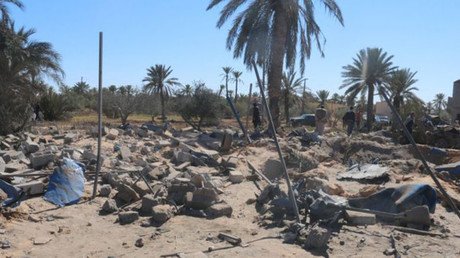US launches air strikes on ISIS targets in Libya
The US military has begun bombing targets around the Libyan city of Sirte, which is controlled by militias associated with Islamic State. The Pentagon says this was the first strike of a new campaign that currently has "no endpoint."
“The presidency council, as the general army commander, has made a request for direct US support to carry out specific airstrikes,” Fayez Serraj, the head of the Libyan presidency council, said in a televised statement broadcast on Monday afternoon, and uploaded to YouTube. “The first strikes started today in positions in Sirte, causing major casualties.”
Serraj added that there would not be a foreign-led operation on the ground. However, US officials told local media sources that the US was preparing to take a greater role in the war-torn country, and said that the Pentagon was preparing for a long-term campaign against Islamic State (IS, also known as ISIS/ISIL).
BREAKING: US Defense official: New airstrikes on ISIS in Sirte will last “as long as needed" to capture Sirte, "decapitate" ISIS in Libya.
— NBC Nightly News (@NBCNightlyNews) August 1, 2016
The bombings were personally authorized by US President Barack Obama, following consultations with Defense Secretary Ash Carter and senior military commanders.
Pentagon spokesperson Michelle Baldanza said the strikes were "consistent with our approach to combating ISIL by working with capable and motivated local forces.”
Baldanza said the Libyan Government of National Accord (GNA) has a chance of re-taking control of the country. The GNA is the official ruling body of Libya and has been endorsed by the UN, but much of the country is outside its control, including the capital Tripoli.
“GNA-aligned forces have had success in recapturing territory from ISIL thus far around Sirte, and additional US strikes will continue to target ISIL in Sirte in order to enable the GNA to make a decisive, strategic advance," said Baldanza.
In a press conference, Pentagon spokesman Peter Cook explained that the strikes will be aimed at “precision targets” suggested by the GNA that will be “vetted” by US officials. He refused to say whether the US was entitled to hit targets without Libya's approval.
Cook said that there were likely "hundreds" and no more than 1,000 Islamic State fighters in Sirte, and said he had no accurate number for the civilians inside the city, famous as the birthplace of Muammar Gaddafi.
The campaign will intend to drive them out, with Libyan ground forces leading the assault.
“We don’t have an endpoint at this point,” Pentagon press secretary Peter Cook, “but we hope that this doesn’t take a significant period of time.”
A resolution passed by the UN Security Council last December entitles foreign countries to hit ISIS targets in Libya, if the attacks are sanctioned by the local government.
So far, the only previous US strikes in February were limited to eliminating a specific ISIS target – a training camp that housed Noureddine Chouchane, a terrorist thought to be responsible for attacks on a museum and the Sousse beach resort in neighboring Tunisia.
Chouchane was reportedly killed in the air strikes, which also took the lives of two Serbian diplomats who were held hostage by the radicals.
This new campaign will be the biggest since a NATO-led bombing helped rebels to overthrow the government of Colonel Muammar Gaddafi in 2011. Despite initial celebrations following the removal of the authoritarian Gaddafi, Libya soon collapsed into a civil war, with divisions along tribal and religious lines.
While ISIS holds power in a relatively small coastal segment of the country, Libya Dawn and other Islamists are in charge in Tripoli and the surrounding areas, while parts of the south are ruled by local militias.













